Sydney Harris Quotes
Most popular Sydney Harris Quotes

We can often endure an extra pound of pain far more easily than we can suffer the withdrawal of an ounce of accustomed pleasure.

The time to relax is when you don't have time for it.

"Elitism" is the slur directed at merit by mediocrity.

Knowledge fills a large brain; it merely inflates a small one.
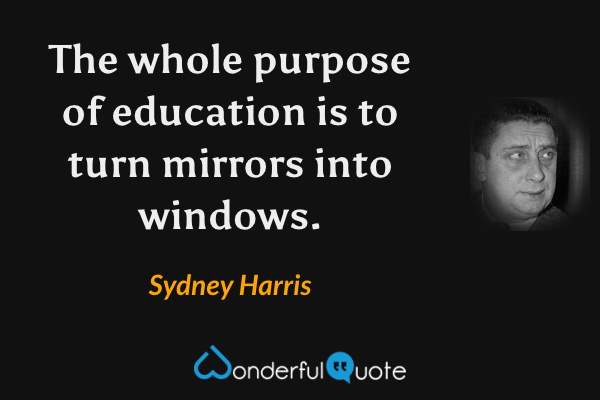
The whole purpose of education is to turn mirrors into windows.

Never take the advice of someone who has not had your kind of trouble.
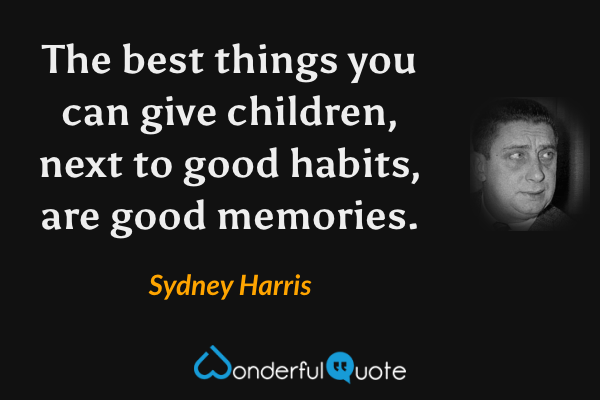
The best things you can give children, next to good habits, are good memories.

More trouble is caused in the world by indiscreet answers than by indiscreet questions.
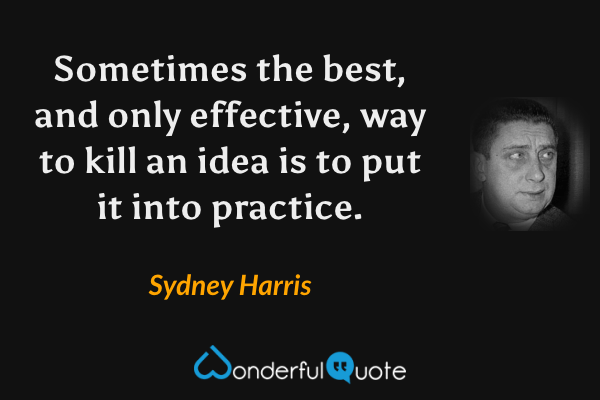
Sometimes the best, and only effective, way to kill an idea is to put it into practice.
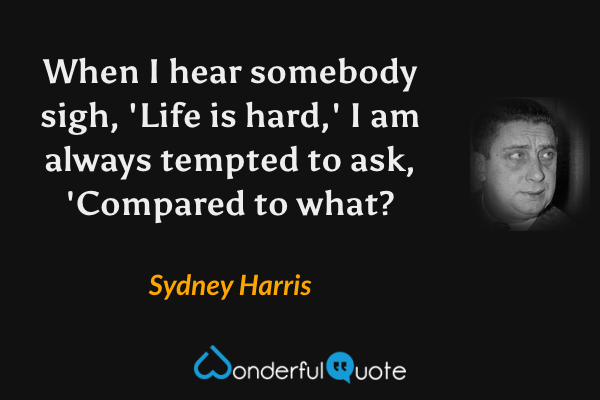
When I hear somebody sigh, 'Life is hard,' I am always tempted to ask, 'Compared to what?
![The unforgiving man assumes a judgment that not even the theologians has [sic] given to God. - Sydney Harris quote.](/img/q/79/13879A-the-unforgiving-man-assumes-a-judgment-that-not-even-theologians-sydney-harris.png)
The unforgiving man assumes a judgment that not even the theologians has [sic] given to God.
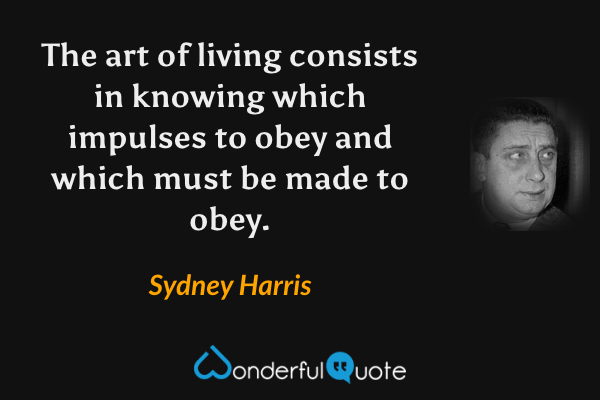
The art of living consists in knowing which impulses to obey and which must be made to obey.

Every morning I take out my bankbook, stare at it, shudder — and turn quickly to my typewriter.
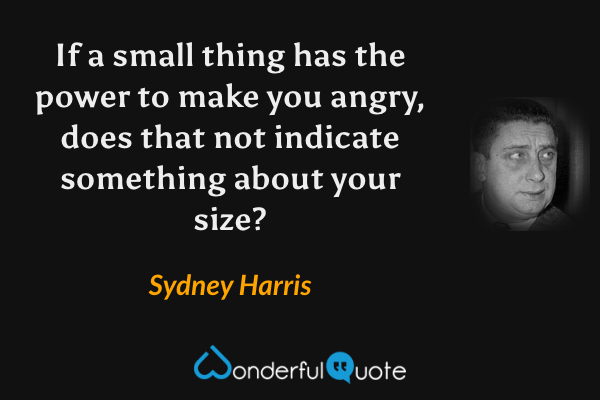
If a small thing has the power to make you angry, does that not indicate something about your size?
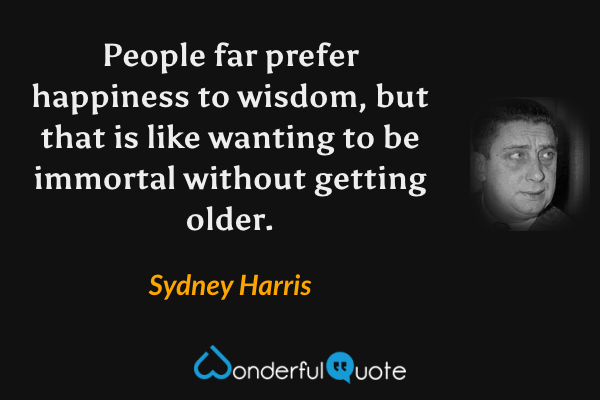
People far prefer happiness to wisdom, but that is like wanting to be immortal without getting older.
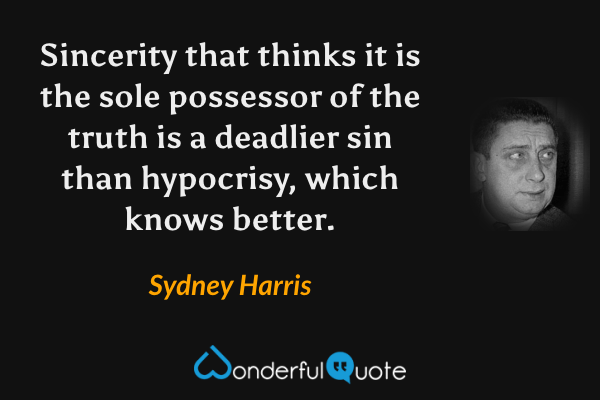
Sincerity that thinks it is the sole possessor of the truth is a deadlier sin than hypocrisy, which knows better.

Being yourself is not remaining what you were, or being satisfied with what you are. It is the point of departure.

The real danger is not that computers will begin to think like men, but that men will begin to think like computers.

The main discomfort in being a middle-of-the-roader is that you get sideswiped by partisans going in both directions.

Regret for the things we did can be tempered by time; it is regret for the things we did not do that is inconsolable.

Democracy is the only system that persists in asking the powers that be whether they are the powers that ought to be.

A cynic is not merely one who reads bitter lessons from the past, he is one who is prematurely disappointed in the future.
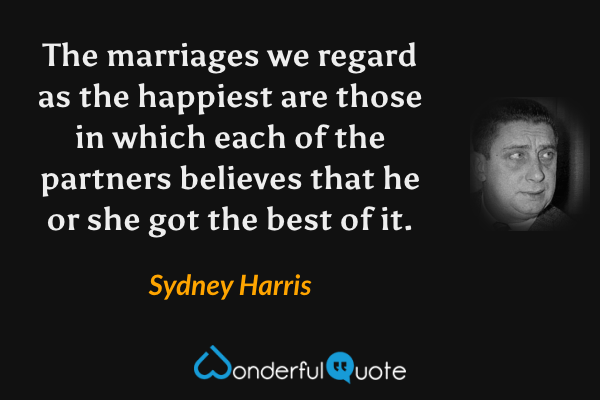
The marriages we regard as the happiest are those in which each of the partners believes that he or she got the best of it.

Nothing is as easy to make as a promise this winter to do something next summer; this is how commencement speakers are caught.

Intolerance is the most socially acceptable form of egotism, for it permits us to assume superiority without personal boasting.

Maturity begins when we're content to feel we're right about something without feeling the necessity to prove someone else wrong.
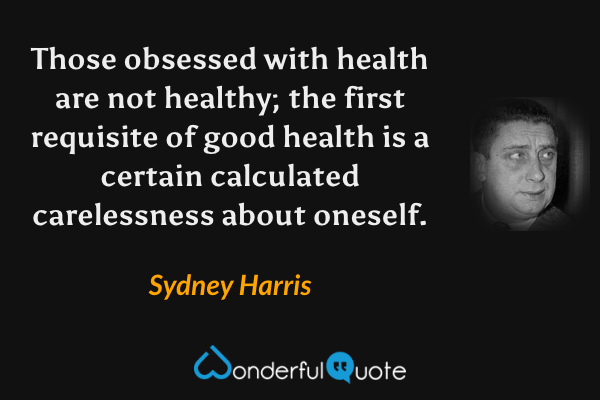
Those obsessed with health are not healthy; the first requisite of good health is a certain calculated carelessness about oneself.

Our dilemma is that we hate change and love it at the same time; what we really want is for things to remain the same but get better.

Self-discipline without talent can often achieve astounding results, whereas talent without self-discipline inevitably dooms itself to failure.

Maturity includes discovering that even an opinion contrary to ours may contain a vein of truth we could profitably assimilate to our own views.
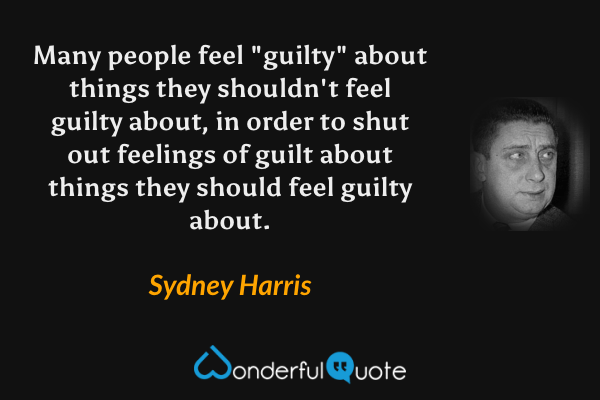
Many people feel "guilty" about things they shouldn't feel guilty about, in order to shut out feelings of guilt about things they should feel guilty about.

The commonest fallacy among women is that simply having children makes one a mother—which is as absurd as believing that having a piano makes one a musician.
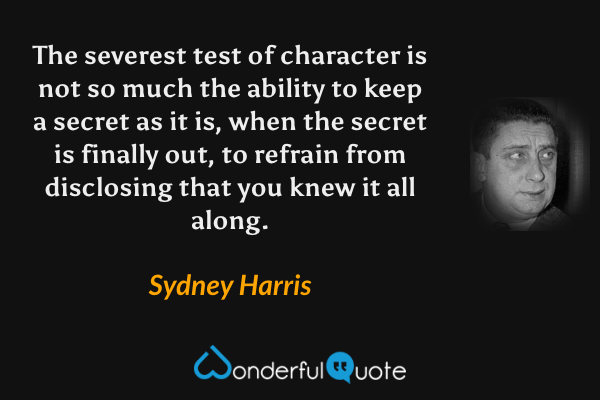
The severest test of character is not so much the ability to keep a secret as it is, when the secret is finally out, to refrain from disclosing that you knew it all along.
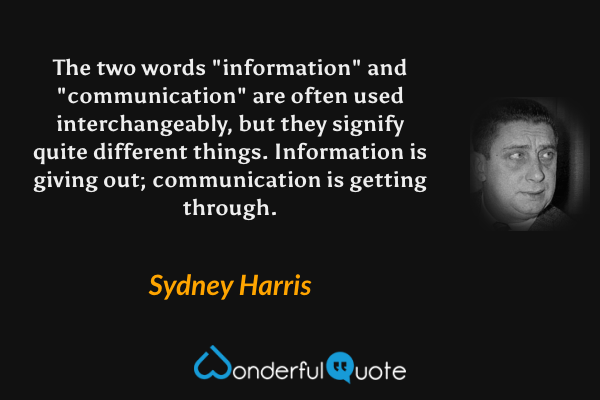
The two words "information" and "communication" are often used interchangeably, but they signify quite different things. Information is giving out; communication is getting through.
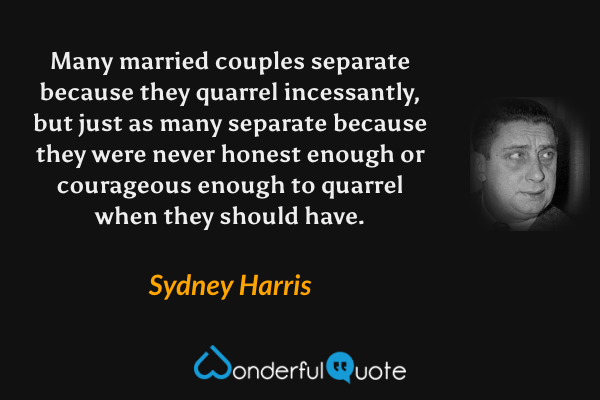
Many married couples separate because they quarrel incessantly, but just as many separate because they were never honest enough or courageous enough to quarrel when they should have.

The three hardest tasks in the world are neither physical feats nor intellectual achievements, but moral acts: to return love for hate, to include the excluded, and to say, "I was wrong."

Perseverance is the most overrated of traits, if it is unaccompanied by talent; beating your head against a wall is more likely to produce a concussion in the head than a hole in the wall.

An idealist believes the short run doesn't count. A cynic believes the long run doesn't matter. A realist believes that what is done or left undone in the short run determines the long run.
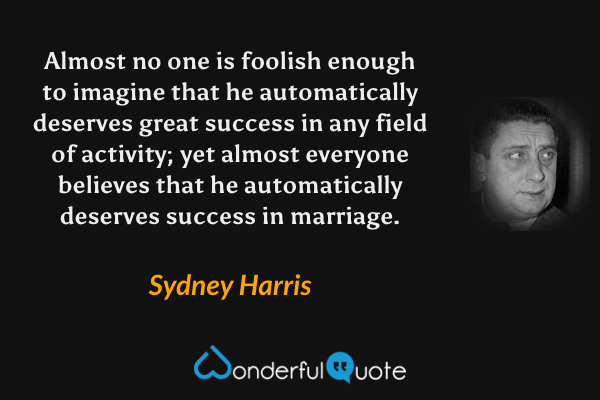
Almost no one is foolish enough to imagine that he automatically deserves great success in any field of activity; yet almost everyone believes that he automatically deserves success in marriage.
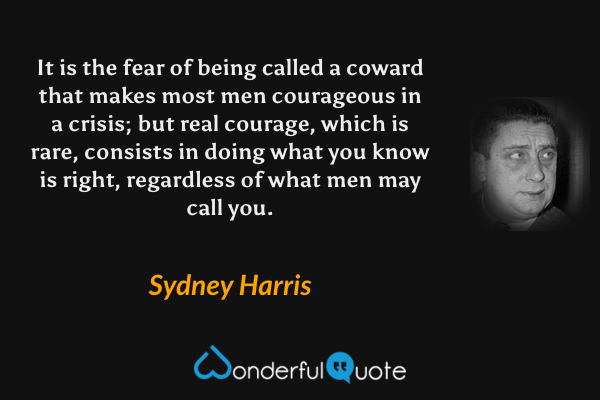
It is the fear of being called a coward that makes most men courageous in a crisis; but real courage, which is rare, consists in doing what you know is right, regardless of what men may call you.

The most important tactic in an argument, next to being right, is to leave an escape hatch for your opponent, so that he can gracefully swing over to your side without an embarrassing loss of face.
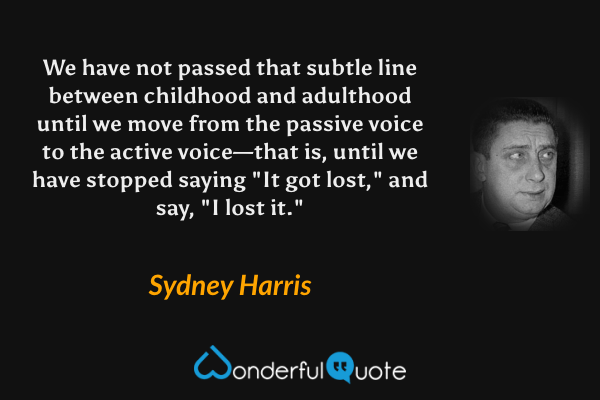
We have not passed that subtle line between childhood and adulthood until we move from the passive voice to the active voice—that is, until we have stopped saying "It got lost," and say, "I lost it."

Youth finds no value in the views it disagrees with, but maturity includes discovering that even an opinion contrary to ours may contain a vein of truth we could profitably assimilate to our own views.

In every field of inquiry, it is true that all things should be made as simple as possible—but no simpler. (And for every problem that is muddled by over-complexity, a dozen are muddled by over-simplifying.)

Take the two popular words today, "information" and "communication." They are often used interchangeably, but they signify quite different things. Information is giving out; communication is getting through.
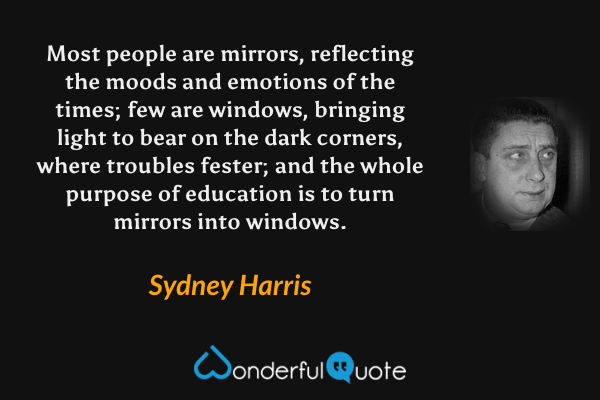
Most people are mirrors, reflecting the moods and emotions of the times; few are windows, bringing light to bear on the dark corners, where troubles fester; and the whole purpose of education is to turn mirrors into windows.
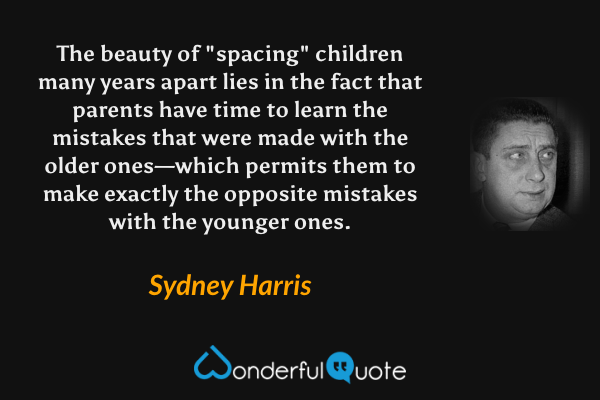
The beauty of "spacing" children many years apart lies in the fact that parents have time to learn the mistakes that were made with the older ones—which permits them to make exactly the opposite mistakes with the younger ones.

Men may be divided almost any way we please, but I have found the most useful distinction to be made between those who devote their lives to conjugating the verb "to be," and those who spend their lives conjugating the verb "to have."
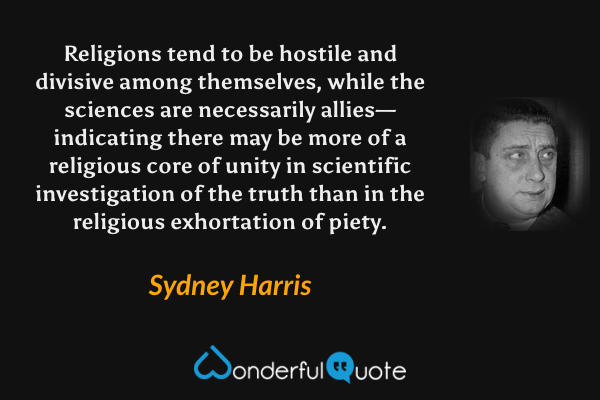
Religions tend to be hostile and divisive among themselves, while the sciences are necessarily allies—indicating there may be more of a religious core of unity in scientific investigation of the truth than in the religious exhortation of piety.

Agnosticism is a perfectly respectable and tenable philosophical position; it is not dogmatic and makes no pronouncements about the ultimate truths of the universe. It remains open to evidence and persuasion; lacking faith, it nevertheless does not deride faith.
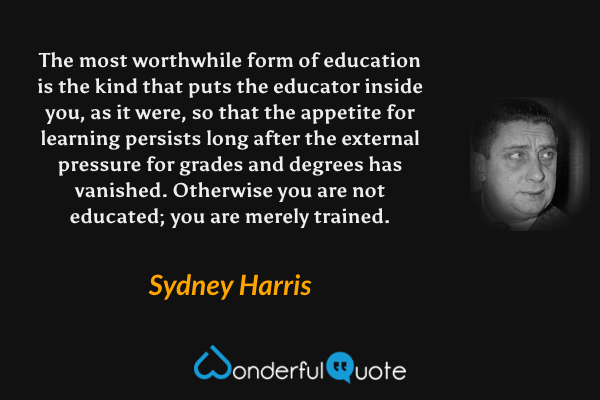
The most worthwhile form of education is the kind that puts the educator inside you, as it were, so that the appetite for learning persists long after the external pressure for grades and degrees has vanished. Otherwise you are not educated; you are merely trained.
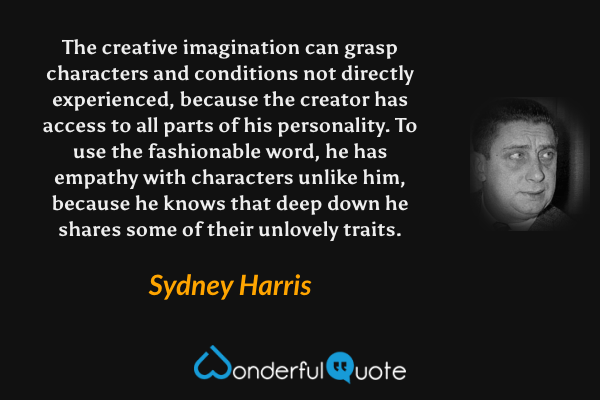
The creative imagination can grasp characters and conditions not directly experienced, because the creator has access to all parts of his personality. To use the fashionable word, he has empathy with characters unlike him, because he knows that deep down he shares some of their unlovely traits.


